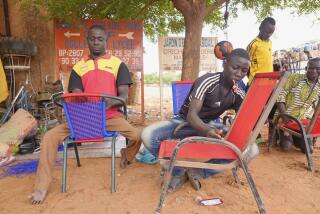Christopher Urges Africa to Create Crisis Force
- Share via
ADDIS ABABA, Ethiopia — In what could be a worldwide model for dealing with regional conflicts, Secretary of State Warren Christopher on Thursday called on Africa’s leaders to deal with their continent’s problems by creating a multinational rapid deployment force.
The unit would provide peacekeepers and humanitarian relief for wars and disasters, beginning with the building crisis of ethnic-based hatreds in Burundi.
Christopher, in a speech to the Organization of African Unity, formally proposed the creation of the African Crisis Response Force, warning: “Burundi today remains on the brink of even greater tragedy. Other nations are also at risk. We must develop the capacity for an effective response . . . and we must find new ways for Africans to work together.”
The United States is ready to back the force with up to $20 million in fiscal 1997 for training and equipment, officials said; more support is being sought from European allies.
The force, as Christopher outlined it, would not be a standing unit. It would be 5,000 to 10,000 individuals drawn from military units of several African countries and assembled swiftly. Although it would be deployed under United Nations auspices, it effectively would be mobilized by the OAU and its new, U.S.-funded Conflict Management Center.
It would be led by Africans, and “its mission would be to protect innocent civilians, ensure the delivery of humanitarian aid and help resolve conflicts in Africa and beyond,” Christopher said, suggesting that the force might be dispatched for non-African crises as well.
The unit, initially, would not be strong enough to intervene militarily in conflicts.
The United States has taken the lead in developing and promoting this proposal as one alternative in dealing with African crises, in large part out of Washington’s frustration with U.N. inaction or lack of interest in the issue.
At least five countries have indicated their willingness to participate, U.S. officials said. Ethiopia told Christopher on Thursday that it is ready to offer two battalions. Mali backed the idea Tuesday.
“Across Africa, conflict is increasingly seen for what it is: an endless drain of lives and resources that squanders opportunities for growth,” Christopher told envoys from 53 African states at the OAU headquarters here in the Ethiopian capital. “The time has come to build on your expertise to create a new political and military partnership.”
The U.S. initiative was tentatively welcomed by OAU officials.
“Anything that helps Africa’s capacity to deal with its problems is welcome,” OAU Secretary-General Salim Salim said at a news conference. The idea “goes along with something we have been trying to do on the continent.”
But he said the proposal needed more study by African leaders, who, before they formally endorse the plan, want the U.S. to clarify points such as: long-term financial commitments for the force; criteria for participation in it; and its command and control--what Salim called the “question of ownership.”
Christopher told the ambassadors that the force has “no patent or exclusivity.” Because of the urgent need for it, the United States has gone ahead and discussed the force with possible participants who expressed interest, had experience in U.N. peacekeeping efforts and were democracies in which civilians control the military.
Although U.S. officials had earlier indicated that the U.N. would not automatically have a role in the force, Christopher said Thursday that the world body would decide to deploy the unit.
But the “genius” of the plan, he noted, was that force members would be trained and equipped, avoiding the delays during which crises often disintegrate into bloody conflict.
Christopher said he hoped that European allies would provide the concern and financial commitment necessary to sustain the plan.
Britain, Ireland, Belgium, and Canada as well, have given “favorable” responses, a senior U.S. official said.
Beyond its initial pledge of $20 million, the United States is prepared to provide its “fair share” of the $25 million to $45 million needed to deploy the force and the annual cost of $5 million to keep it at the ready.
Later, OAU officials still had questions. A senior envoy, for example, said there would be “problems” if troops were pulled only from U.S. allies.
If continental leaders endorse the U.S. plan, as expected, Washington hopes to dispatch a military team to evaluate the Africans’ training and equipment needs.
U.S. officials hope the force could be ready to deploy--after training, equipping and some initial exercises--in four to six months.
The proposal reflects a shifting U.S. approach to post-Cold War crises, especially in developing nations.
In the 1990s, the United States has hit hard times in places such as Somalia, where it eventually withdrew troops as fighting raged on.
“We’re going to stay engaged, but we can’t do everything,” a senior administration official said Thursday.
Meanwhile, on Thursday, Salim, the former Tanzanian foreign minister who has headed the OAU for two terms, said he was not, as some have suggested, a candidate for U.N. secretary-general. He indicated, though, that he would serve if drafted.
He told reporters that he had been Africa’s unanimous candidate for the U.N. leadership post in 1981 and not made it--and that he is not interested in having the experience again.
On his swing through Mali, Ethiopia, Tanzania, South Africa and Angola, Christopher has been appealing to African leaders to identify candidates to succeed U.N. Secretary-General Boutros Boutros-Ghali, whose term is to end in December.
Washington opposes the outspoken Egyptian’s reelection, arguing with him over the cost and size of the U.N. bureaucracy and other policy matters.
More to Read
Sign up for Essential California
The most important California stories and recommendations in your inbox every morning.
You may occasionally receive promotional content from the Los Angeles Times.










